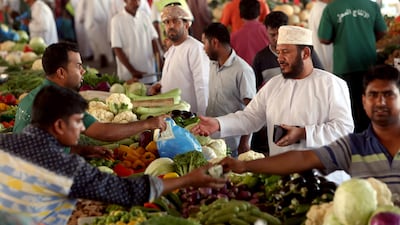As shops prepare to stock up for Ramadan, Oman's residents fear that food prices will increase during the fasting month, following a trend of previous years.
While shop owners prepare for the most profitable month of the year, consumers say food prices are already rising as people plan their Ramadan shopping.
“A 20kg bag of rice today cost me 15 rials [$40] which normally costs just 11 rials. There is a hike of about 25 per cent of the normal price. The shopkeepers know that we need to buy food for Ramadan and that’s why they put up the prices,” Salim Al Maashari in Muscat told The National.
Shop owners have defended the price increases and said the market is paying for the higher cost of the supply chain during the fasting month.
“Since families consume more food in Ramadan, the cost of transportation goes up because the food distributors need heavier vehicles to supply shopkeepers with more food, ” said Saleh Al Araimi, a food shop owner in Alkhuwair in Muscat.
"We don’t make any more money, because the extra cost is just passed to us and we pass it to consumers."
But supply chain operators deny that they have increased the cost of transporting goods before Ramadan.
“No, we did not increase the transportation charges of food in any part of the country. They [shop owners] are just greedy and take advantage of consumers since people cook more food in Ramadan," Suleiman Al Hajri, owner of Alhajri Transportation Company, told The National.
"Our transportation charges are fixed throughout the year.”
One consumer has suggested that the government clamps down on shopkeepers who are raising prices for the holy month.
“It happens every Ramadan [food prices increase] and we request officials to check the food prices of all stores to make sure shopkeepers do not take advantage of consumers,” said Ahmed Al Saadi, a resident of Muscat.
Experts said inflation compounded the food price increases this Ramadan season, although retailers still take advantage of the rise in demand during the fasting days to raise prices.
“There is an inflation for staple food of 2.3 per cent in 2022 compared with the year before. But retailers are taking advantage now ahead of Ramadan simply because the food demand traditionally increases in this period,” said Nadhim Al Juma, an economist at the Finance Ministry.
A shopkeeper told The National that staples such as rice, flour, wheat and meat had gone up more than the usual annual inflation rates.
“You need to add about 20 per cent on top of the usual annual inflation [2.3 per cent] to the normal prices before Ramadan buying started this week.,” Khalid Al Naamani, store owner of AlKhaleej Supermarket, told The National.
"However, once Ramadan and Eid festivities are over, prices will go back to normal."
A spokesman from the Ministry of Commerce, Industry and Investment Promotions said it would start inspections from mid-March to make sure shops do not take advantage of consumers.
“We are sending out a team of inspectors in Muscat to make sure the food prices are stable and shop owners do not hike costs to hurt consumers in the holy month,” the spokesman told The National.
He said a fine of 2,000 rials ($5,000) would be imposed on offenders.
This year, Ramadan is expected to start on about March 23, when Muslims will fast from morning to dusk.


















